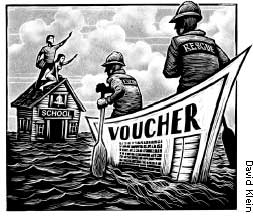By David Bozeman
In 2000, George W. Bush reclaimed the presidency for the GOP (albeit by a whisker) by co-opting such Democratic ‘kitchen table’ issues as education. Granted, in 2000, with relative peace and prosperity, such a softer message could far better resonate. But today, with a shaky world economy, the need for real education reform is as strong as ever, and conservatives, once again, can take the lead in addressing a problem that has, sadly, remained dormant for much of the last decade.
President Bush’s No Child Left Behind produced a mixed bag of results, but his remarks about the “soft bigotry of low expectations” highlighted the educational ghetto that has trapped so many poor, inner-city students in cycles of low test scores, high dropout rates and poverty. A post-9/11 world slowed the momentum toward greater reform, and the Obama Administration has, predictably, reversed some positive trends toward offering disadvantaged students the same choices enjoyed by wealthy liberals (President Obama, for the record, sends his daughters to an elite, private school).
The Democrats, by way of Senator Dick Durban of Illinois, cut funding for the District of Columbia’s voucher-based Opportunity Scholarship Program, an initiative that supporters claim raised student test scores. Voucher opponents, including President Obama, fear the effects of taking money out of the public system.
Interestingly, liberals, to whom ‘choice’ is all the rage in sexual matters and who preach the wonders of diversity in the workplace and higher academia, are dead set against allowing education dollars and students to venture outside the NEA’s cookie-cutter ghetto. Obama, despite his support for charter schools and greater emphasis on math and science, mouths feel-good platitudes, such as “rewarding good teachers, stop making excuses for bad ones and demanding results from government at every level.”
But neither left nor right in 2010 appears serious about reform. As long as primary education is a public monopoly, no one can expect the public sector to reform itself out of a job, outside of the occasional tweaks in time for elections. Not even the D.C. school system, notorious for low-test scores, crime and high dropout rates, elicits the national outrage it would if it were a private company failing its customers with such alarming consistency. According the The Washington Post in July of ‘09, only about one half of elementary students in the District’s public schools were deemed proficient in math and reading. This was an increase from about one-third in 2007. Gains at the middle and high school levels were more modest, with proficiency rates around 40%. Also disturbing, the Post reported in June of last year a study that put on-time graduation rates below 50%.
Howard Rich, of Americans for Limited Government, notes that there aren’t enough choices out there to create a real constituency for change. When fed mediocrity long enough, one considers it the norm. He writes that nationally, only about 60,000 students receive scholarships. Parental choice simply isn’t available in most states and usually consists of government controlled means-tested programs.
True education reform is not a mere ‘issue’ that could gain traction. It speaks to the individual needs and potentials of all American students. Some will excel in technical trades, some will shine artistically, and some will require the strict discipline of religious instruction. The next leg of the Tea Party movement could ask why the Democrats, who campaigned on ‘change’ and a ‘yes, we can’ chant, are unwilling to defy a status quo that inner city students and their parents have already confronted. The American Right could do well with leadership to step forward and side with the students of the District of Columbia and all students and their parents across the land. Sometimes being on the winning side of an issue is not as important as determining yourself what the defining issues are.
Like it or not, our economy is no longer industrial-based. Many if not most jobs of the technical and information age require 21st Century training, and the future, whether one is discussing education, the economy or politics, belongs not to those who merely react but to those who ACT. Whichever side steps up to speak for students will own the education agenda for the upcoming decade.
David Bozeman, former North Carolina Libertarian Party Chairman, is a Liberty Features Syndicated writer.


